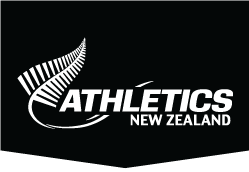News & Updates
Stateside Stories
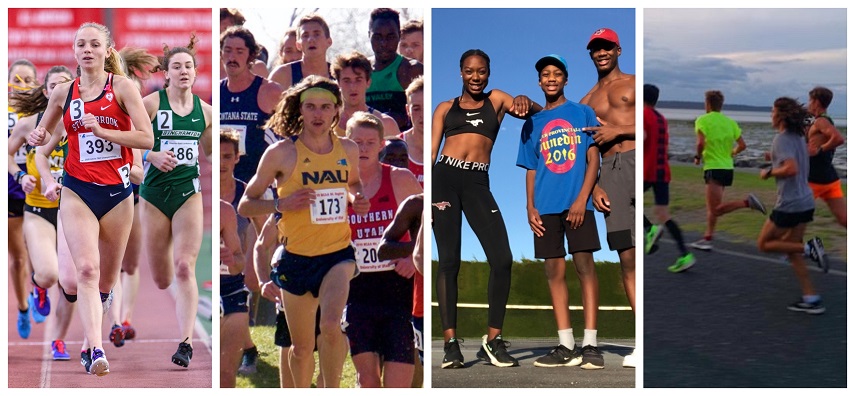
Many Kiwi athletes are based in the USA on university scholarships. Steve Landells speaks to four collegiate track and field performers to gauge their progress during the COVID-19 pandemic.
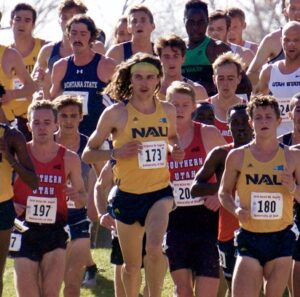
George Beamish
For 2019 NCAA Indoor Mile champion George Beamish, the COVID-19 pandemic has led to some uncertainty as to his next athletics move. The 23 year old, who hails from Havelock North, had earlier this year enjoyed an impressive indoor season, setting a 3000m PB of 7:44.67 and running a slick lifetime best of 3:56.90 – to place sixth in the iconic Wanamaker Mile in New York. Yet shortly after featuring at the pre-event press conference for the 2020 NCAA Indoor title in Albuquerque, in which George was looking to mount a successful defence of his mile title, the COVID-19 pandemic unwelcomingly destroyed his ambitions.
“The day before the event the arena was empty,” he explains. “Hand sanitiser was everywhere and we couldn’t shake hands with anyone. Then a couple of conferences pulled out, which only left a field of nine for the mile. It was only when I was putting on my spikes that we got word we wouldn’t be racing (after the meet was cancelled).”
Describing the news as “a shock” he returned by car to his base at Northern Arizona University in Flagstaff. Having already completed in-person classes, he later finished his final exams and has subsequently graduated in civil engineering. Training has taken a back seat, as he has struggled with a possible stress reaction to the lower leg, although because of state restrictions caused by COVID-19, he has been unable to access the medical support to determine the precise nature of the injury. Living in a small bubble of just himself and one other NAU athlete (two other athletes in the house have returned to California) he has tried to remain positive.
“I’ve tried to view the lockdown as if I’m having an extended break, so maybe it is a good chance to let the body heal and take a step back from running. I’m not under pressure to train or perform, so I’m just trying to frame it all in the right way.”
The former Wanganui Collegiate student had hoped to target the New Zealand Olympic team for either the 1500m or 5000m, and this is still a possibility for 2021. Yet whatever happens, he is likely to remain in the US and is exploring a couple of possibilities for his future.
“I now have an extra season of outdoor eligibility open to me after the cancellation of this season, so I could come back and study for another year and run an outdoor season. But I’ve also spent the past couple of months talking to several agents to see if there is a possibility to turn professional.”
Photo Credit: Shannon Thompson
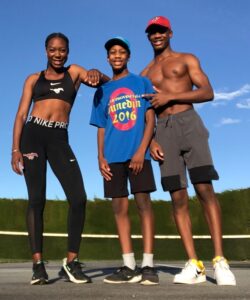
Atipa Mabonga
As COVID-19 started to impact the USA, former New Zealand U20 triple jump champion Atipa Mabonga opted to make the long journey back to the comfort of her family home in Southland. A sports management and advertising student at Southern Methodist University (SMU) in Dallas, Atipa was looking forward to the outdoor season, only for her world to rapidly change. The COVID-19 pandemic caused the university to shut campuses and all college sport was cancelled in March. The news came like a thunderbolt and tested the resolve of the naturally upbeat athlete.
“I’d been so excited ready to do my junior season outdoors to have that taken away was heartbreaking,” explains Atipa. “The next challenge was to keep up the motivation and to have the resilience to keep on training knowing that the next outdoor season was one whole year away.”
Continuing to study online, the 21 year old also soon faced the choice of whether to stay in Dallas or return home to New Zealand. With borders rapidly closing she discussed the matter with her father who advised that whatever decision she took, she should plan for the long-term.
“My lease on the flat was due to end in May and that would have made it complicated to stay in the States. I also didn’t want to be alone for a number of months, so within a couple of days I booked my flights to New Zealand, gave notice and I packed my bags.”
After 14 days in self-isolation at the family holiday home in Te Anau, she returned back to the family home in Otautau near Winton. Studying has been a challenge, having to regularly wake up at 2am for classes and earlier this month completed a week of exams at 3am (NZ time). Naturally, the demanding hours took a toll, but the ever-smiling athlete has managed to maintain her fitness by training with her two younger brothers – Takunda, 18, the New Zealand U20 triple jump bronze medallist, and 12 year old Mako.
“I’m trying to keep as healthy and fit as possible using everything from bottles of milk, to jugs of water as weights,” she says. “I’ve tried to make training fun and entertaining. Takunda is stronger and faster, but it’s been competitive and we push each other so much. We’ve done lots of circuit training and running, and we have one workout called ‘champagne training’ in which we run 12x100m, then complete two exercises like squats or burpees at the end of each 100m rep.”
Atipa intends to return to the US to resume her senior year in August, with the goal of making the NCAA finals next year. Internationally the Commonwealth Games and World University Games are future goals but whatever the future brings, Atipa will approach the challenge with optimism.
“It is important to see the positive side and not be brought down by the pandemic. Yes, it is heartbreaking and challenging but it is best to use that as motivation for the future.”
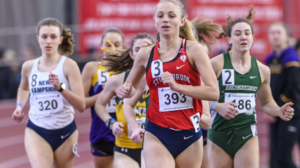
Holly Manning
For Kiwi Holly Manning, the rapid arrival of the COVID-19 pandemic has triggered both a university transfer and a coaching change for the 800m specialist. The 23 year old masters student at Stony Brook University was looking forward to the outdoor season, having posted an indoor PB of 2:08.81 at Boston in March, only for the coronavirus to dramatically alter her plans.
“Everything happened so quickly,” she says. “The first time we talked about it (the virus) was after the ECAC Championships (where Holly set her indoor PB) when we found out Harvard University had closed its campus and pulled out of the NCAA Championships. A few days later we heard other conferences had pulled out of the meet. Our athletics director then called a meeting to say we are going to get through this, we are going to grind it out, only for the assistant to tap him on the shoulder and show him a tweet from the NCAA Championships, which said all spring sports were cancelled. It was the worst week of my life and I had to decide whether to go home (to Napier).”
Following a long chat with her parents and doubts about whether she could feasibly study at an American college while working remotely from New Zealand, or whether she would even be able to re-enter the US during such uncertain times, she opted to stay. However, she no longer saw her future at Stony Brook, which is based on Long Island in New York State, where she has been based since 2015. So Holly used the opportunity to transfer to the University of Delaware, the home state of her boyfriend, to study a masters in International Business.
“After the season was cancelled I realised I had one more year of eligibility (to compete in collegiate athletics) and I still felt I had unfinished business,” she explains. “I’d just set my fastest indoor 800m time, I was feeling fit and strong and I thought it was an opportunity like no other. I not only have my boyfriend in Delaware but many friends, it feels like my American home.”
She spent lockdown in Delaware with her boyfriend’s parents and was relieved to have left New York State, which has been ravaged by coronavirus. For the past couple of months, Holly has taken a relaxed approach to running, using the opportunity to hit the trails and enjoy the surroundings and also carry out some cross-training. Last month she also connected with a new coach, Delaware-based Ryan Waite, and Holly is looking ahead with optimism to the 2021 season.
“My dream when arriving in the US was to qualify for the Olympic Games and represent New Zealand,” she says. “I may not have achieved the goals I wanted to but I feel I’ve gained a lot of strength in other areas. Next year I’d like to qualify for regionals and take a shot at qualifying for nationals, I believe the new partnership with my coach will lend itself to that.”
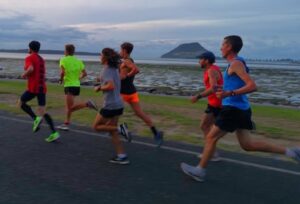
Sam Tanner
Training with the strongest endurance running group in New Zealand has served up a fascinating twist in the COVID-19 journey of University of Washington athlete Sam Tanner. Describing his move back home from the US because of the coronavirus as a “blessing in disguise”, he is currently part of a powerful Tauranga-based training group, which includes New Zealand’s fastest two marathoners – the Robertson twins, Zane and Jake – New Zealand 5000m champion Hayden Wilde, and New Zealand U20 10,000m record-holder Aaron Pulford.
“To come back home and to train with an amazingly talented group of athletes has been really nice, I’ve done a couple of sessions and a long run with the Robertson twins, Hayden and Aaron. To have enjoyed quality runs with New Zealand’s fastest endurance athletes has been great,” adds Sam, who started training with the group since New Zealand went into an Alert Level Two.
The 2019 New Zealand senior 1500m champion left these shores to take up a scholarship at the University of Washington in Seattle last August. After taking time to adjust to his changing circumstances over time, Sam, who is coached by Andy Powell, slowly started to settle into his environment and enjoyed an encouraging indoor campaign. Despite struggling with a few injury niggles, and suffering the misfortune of falling over a prostrate runner with 200m to go in Seattle when all set for an NCAA Indoor mile qualification mark, he later posted an impressive indoor 1500m PB of 3:39.49 in Boston. Sam was then looking forward to a crack at an Olympic qualification mark at the Brisbane Track Classic in Queensland until the pandemic put an abrupt end to his plans.
“My workouts had shown I was in shape to run a 3:57 (or 3:56 mile indoors) but then NCAA nationals and the Brisbane Track Classic were cancelled because of the virus. I thought, oh my goodness this is a big deal! It was chaotic for a time. I tried to take it in my stride, although I was a little bit worried because I was not sure what affect it would have on my season.”
After talking to his coach, Andy, and not knowing how long the pandemic would last, Sam returned to his home in Papamoa to be reunited with his parents and four siblings. Following two weeks in self-isolation, he returned to training solo where he has focused on strength work and averaged between 50 to 55 miles per week. Training on his own, he returned “to his roots” but since New Zealand went into Level Two, he has thrived under the training of his new star-studded group.
“It’s been quite refreshing for me to hang out with a group of older athletes,” he says. “It’s been nice to run with my former coach’s (Craig Kirkwood) training group. Hayden was my regular running partner when I was back in Tauranga and it is nice to run with him once more.”
Continuing to study his course online during his time back in New Zealand has meant a few early mornings for Sam, although given the global uncertainty at the moment, he has no fixed future plans.
“When I go back to America is up in the air because it depends on when borders will re-open,” he says. “If there is no cross country season and I can still study online I might stay here. In the shorter term, I might run a couple of virtual races and enjoy my training group for a while longer.”
